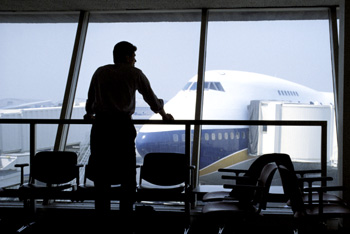 Sept. 20, 2013 – The U.S. Supreme Court in December will hear a case involving Appleton-based Air Wisconsin Airlines Corp., which says it was immune from a lawsuit by a former pilot who obtained $1.4 million judgment for defamation in Colorado.
Sept. 20, 2013 – The U.S. Supreme Court in December will hear a case involving Appleton-based Air Wisconsin Airlines Corp., which says it was immune from a lawsuit by a former pilot who obtained $1.4 million judgment for defamation in Colorado.
William Hoeper, a former Air Wisconsin pilot, obtained the award based on allegations that an Air Wisconsin manager caused him to be arrested by falsely reporting Hoeper as a potential security threat to the Transportation Security Administration (TSA).
Hoeper, who lived in Denver, traveled to Virginia to take a pilot’s test that would certify his ability to fly a different type of aircraft, a test he had failed three times previously.
With his job on the line, he failed this one too, but not before yelling profanities at test administrators who he claimed were sabotaging him. One administrator called Air Wisconsin’s manager, Patrick Doyle, to say that Hoeper’s outburst had startled him and he feared briefly for his physical safety. Doyle booked Hoeper a flight back to Denver.
However, Doyle realized that Hoeper could be carrying a TSA-issued firearm. Federal statutes authorize the TSA to “deputize” pilots as so-called federal flight deck officers. The statute does not authorize pilots to carry issued firearms if traveling as passengers.
Based on the information, Doyle told TSA that Hoeper was traveling to Denver via Virginia, and had concerns about Hoeper’s mental state. He also notified TSA that Hoeper was a flight deck officer, was fired that day and could be carrying his firearm.
TSA arrested Hoeper and searched him. Hoeper filed suit in his home state of Colorado, alleging defamation under Virginia law, where Hoeper was arrested.
Air Wisconsin moved for summary judgment, arguing that the federal Aviation and Transportation Security Act (ATSA) encourages airlines and airline employees to report security threats by granting immunity from lawsuits that stem from such reports.
However, a jury found that Doyle made defamatory statements “knowing that they were false, or so recklessly as to amount to a willful disregard for the truth.” For one, he told TSA that Hoeper had been fired that day, but Hoeper had not been fired yet.
Ultimately, the Colorado Supreme Court ruled that Air Wisconsin was not entitled to immunity, concluding that ATSA immunity did not apply because Doyle made statements “with reckless disregard as to their truth or falsity.”
The court also rejected Air Wisconsin’s claim that Hoeper could not overcome the First Amendment, which requires plaintiff’s to prove actual malice in defamation suits involving statements of public concern in order to obtain punitive damages.
Air Wisconsin petitioned the U.S. Supreme Court for review, asking whether lower courts can “deny ATSA immunity without deciding whether the airline’s report was true.”
It also asks whether the First Amendment “requires a reviewing court in a defamation case to make an independent examination of the record before affirming that a plaintiff met its burden of proving a statement was false.”
Air Wisconsin, a partner with U.S. Airways and United Airlines, says that upholding the ruling in Hoeper’s favor could result in air carriers refusing to report potential airline security threats for fear of defamation suits. Oral arguments will be held Dec. 9. The case is Air Wisconsin v. Hoeper.
